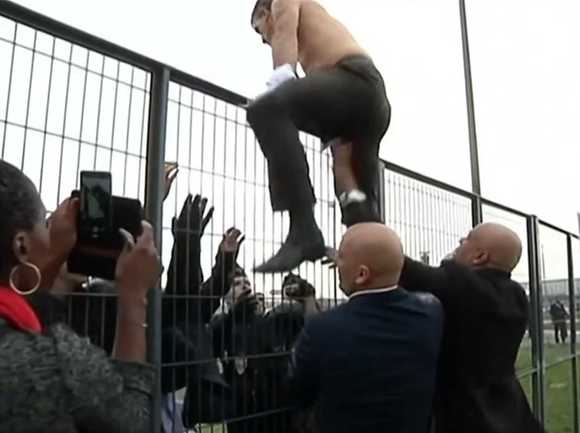Let’s start with an example from recent history, the Air France strike of October 2015. Pierre Plissonnier, Vice-President of Air France, and Xavier Broseta, human resources director, escaped from protesting Air France personnel by climbing, half-naked, over a high airport fence.
Social and industrial conflict may, of course, lead to militant action anywhere in the world. But the level of militancy frequently witnessed in France (often supported by public acceptance) goes beyond what would be expected in most other Western countries.
Where else but in France would strikers threaten to blow up their factory?!
What other country has made bossnapping (i.e. taking the CEO hostage) a tradition?!
Where else would you expect angry farmers to block fruit trucks or supermarket freezers and dump their load so as to paralyze national roads?!

“The culture of protesting is entrenched in France and when it comes to the authorities as well as public opinion, there is a certain tolerance that you might not find elsewhere,” explains historian Stéphane Sirot, who specializes in French social movements.
Historians, sociologists, interculturalists and journalists often connect their observations to a fundamental national narrative, celebrated as the National Holiday in France every year. July 14th commemorates the storming of a State Prison and the subsequent execution of the King.
As a side-note it is worth mentioning that a century before the French King’s execution a ruling king had been executed in London. In Britain today, only historians really know about King Charles I’s unfortunate end. This dramatic act of violence is not part of public discourse in Britain today.
To make our point clear:
A concept of ‘culture‘ based on the “collective programming of the [national] mind” lacks validity. The shortcomings of a theory reducing culture to collective psychological phenomena have been pointed out by many critics over the last 25 years.
However, understanding the term ‘culture’ as indicating discourse communities connects these with (hi)story, narratives, myths and practical communication.
This approach implies that each of us relates to multiple discourse communities (among them those marked by ‘national narratives’). And it should not be forgotten that the discourse communities we relate to make up important aspects of our individual personality. As well as that these discourse communities change as we go through life.
It is this approach that helps to provide plausible explanations of many cultural phenomena (e.g. traditions of militancy in France). Even more importantly, it opens paths to effective (inter-) cultural training focussing on practical discourse and appropriate communication.
This is where categories of cultural analysis connect with effective intercultural training methods. Like our ICE Blended Learning Course.
Power distance, that is the extent to which the less powerful members of organizations and institutions accept and expect that power is distributed unequally. (Geert Hofstede. Cultures and Organisation. Software of the Mind. 2005)
According to G. Hofstede’s psychological construct, Power Distance in France is twice as high as in Britain or Germany. Many experienced interculturalists in France and elsewhere have questioned this, among them Jacques Pateau [Une étrange alchimie: La dimension interculturelle dans la coopération franco-allemande.1999] and Judith Jahn [Kulturstandards im deutsch-französischen Management. 2006]. Philippe d’Iribarne also repeatedly refers to history to explain cultural features specific to France [L‘Étrangeté Française. 2008].
